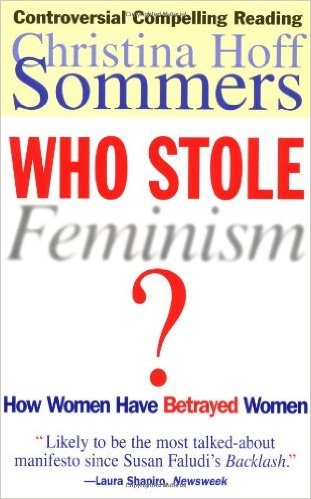|
So I heard a super interesting story about one of my favorite feminist scholars today.
Last year, campus Republicans announced that they would be hosting Christina Hoff Sommers at Oberlin College, and regressive liberals began organizing protests and safe spaces. (Did you know that students at Brown and Oberlin are so busy with their protests that they are failing out of their classes?)
The outrage was so over-the-top that political commentator Bill Kristol invited Sommers to share her experience on his show. During the interview, Kristol asked, "How did this happen?" And so the story began... *** After earning her Ph.D. in philosophy from Brandeis University in 1979, Sommers earned a professor position at Clark University. After a few years, the chair of her department asked her to consider teaching feminist philosophy. Sommers thought, Well, okay, I'm a feminist, and I'm a philosopher, so why not? But then something weird happened. She sent away for the textbooks, assuming that they would read like other philosophy texts: a collection of the best arguments about issues that concerned women -- affirmative action, abortion, maternity leave, etc. The textbooks shocked her. According to Sommers, they presented what looked like a "conspiracy theory" against the patriarchy. The arguments weren't debates -- they were mutually reinforcing. She couldn't, in good conscience, use them. "I just thought it was a sacred commandment of college teaching," Sommers told Kristol. "I never saw the classroom as a place to pass on my beliefs to students." So she sent away for more textbooks-- and saw more of the same. So she went to the American Philosophy Association to raise her issues. She entered this presentation knowing that issues brought before the APA are always contentious -- but usually everyone, being reasonable adults, goes out for drinks after. Sommers recalls, "We did not go out for drinks after. There was hissing, and booing, and stamping their feet. And that evening, I was excommunicated from a religion I didn't even know existed." Prior to this event, Sommers' articles had occasionally been included in feminist studies texts -- and after, that stopped. Someone was interested in hearing her thoughts on this, though: The Atlantic. They commissioned a piece from her, and she began doing research -- and was shocked by some of her findings. She read preposterous claims that were not backed by psychology and began further questioning feminist theories. Her article was never published in the Atlantic -- because the feminist philosophers found out she was writing it, and campaigned against the Atlantic. A version of it did appear in the New Republic -- and, ultimately, the research culminated in her 1995 book, Who Stole Feminism? How Women Have Betrayed Women.
(In 2015, she also published The War Against Boys: How Misguided Policies are Harming Our Young Men, which is also worth reading, even though I don't agree with all of it.)
*** I find it fascinating how Sommers stumbled upon what ended up being an incredible career for her -- and, while I don't agree with everything she writes, I continue to be fascinated by her process and her arguments. But here's what I want to know: In spite of getting my first A+ at Stanford in Gender Psychology, I don't actually know a whole lot about "Feminist Studies" or "Feminist Theory." I guess I'd always assumed that it was like an extended version of my Gender Psychology class, where you learn about biological and psychological differences between men and women. I always assumed it has its own rigors and methodologies. I assumed it used the scientific method of thinking. I assumed healthy amounts of skepticism were encouraged. But, as of the late 1980s, this was not Sommers' experience. Has this changed? Has the field matured and developed? In what ways is it scholarly and objective? What are the standards, rigors and methodologies that characterize feminist studies? In the typical Feminist Studies class, do actual debates happen? Do textbooks present actual conflicting views -- or are arguments still mutually reinforcing? This is a serious question. I would love to hear the experience and perspectives of current feminist studies majors.
2 Comments
T L
9/9/2021 11:12:59 pm
hi, could you please elaborate as to what, among sommer's arguments, you disagree with?
Reply
9/14/2021 05:23:31 pm
In general, I agree with a lot of her earlier feminism stuff, and I agree with her criticisms of extreme, regressive feminism. I agree that women are warriors, not butterflies, and that we shouldn't treat them like they're so fragile. I also enjoyed her book, One Nation Under Therapy: How the Helping Culture is Eroding Self-Reliance (https://amzn.to/3kbjWQJ). I agreed with a lot of what she wrote, but I'm ambivalent about the chapter about addiction, just because I don't know enough to have a strong opinion.
Reply
Leave a Reply. |
About the Author

Eva is a content specialist with a passion for play, travel... and a little bit of girl power. Read more >
Want to support The Happy Talent? CLICK HERE!
Or Find me on Patreon!
What's Popular on The Happy Talent:
Trending in Dating and Relationships:
What's Popular in Science: Playfulness and Leisure Skills:
Popular in Psychology and Social Skills:
Categories
All
|




























 RSS Feed
RSS Feed